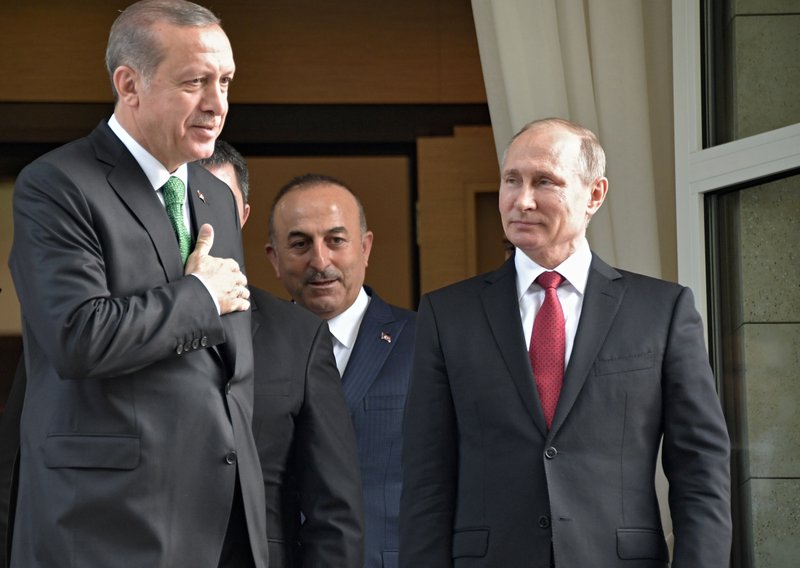BEIRUT -- The presidents of Russia and Turkey said Wednesday that they support the creation of safe zones in war-torn Syria as a delegation of Syrian rebels walked out of cease-fire talks underway in Kazakhstan, citing repeated violations of a similar truce agreed on with the Damascus government in December.
Meeting in the Russian resort town of Sochi, Recep Tayyip Erdogan and Vladimir Putin expressed hope that the Syrian government and rebels would adopt this latest proposal to "de-escalate" the conflict, which has run for six years and claimed some 400,000 lives.
Turkey and Russia are deeply entangled in the war in Syria, including each having troops on the ground there -- Ankara supporting various Syrian opposition factions and Moscow backing President Bashar Assad's forces.
Before the rebels suspended their participation at the talks in Astana, the Kazakh capital, Russian representatives had presented the rebels with a proposal for four "de-escalation zones" in Syria where the warring sides would be separated by "security lines." The Astana talks are proximity talks, with Syrian government representatives and the rebels separately meeting with Russian officials and other representatives.
The rebels demanded a halt to the government's bombardment of opposition zones in Syria.
In Sochi, Putin said Russian and Syrian government jets would halt flights over the specified zones if all sides respect the cease-fire.
Russia's 2015 military intervention in Syria and its air campaign have significantly boosted Assad's gains in the war. However, human-rights groups say Russia is implicated in targeting hospitals and schools and using indiscriminate cluster munitions and incendiary weapons against civilian areas as well.
The proposal presented to the rebels in Astana delineates four zones in Syria where front lines between the government and rebels would be frozen and fighting halted, according to a statement made by rebels. The four include areas in the provinces of Idlib and Homs, the eastern Ghouta suburbs outside Damascus, and an area in the south of the country.
The zones, according to the document received by rebels, would be monitored by international observers and allow for the voluntary return of refugees.
Late Wednesday, Syria's Foreign Ministry said Damascus is "fully backing" the Russian initiative on the four cease-fire areas, according to the state-run Syrian Arab News Agency.
But Ahmed Ramadan, an opposition representative, said rebels would request written answers on several questions, including why the cease-fire would only be in effect in the four areas instead of a nationwide truce.
Ramadan also urged that the sides respect an earlier cease-fire deal that was reached in December and that also included provisions for the release of detainees. He clarified that the rebel side, though it suspended its participation in the talks, would wait in Astana for a reply.
This is the fourth round of talks in Astana since January. Separately, there have been five rounds of U.N.-sponsored Syria peace talks in Geneva since 2012, but none has led to a sustainable cease-fire.
Later Wednesday, U.N. envoy to Syria Staffan de Mistura called on the rebels to return to the talks in Astana "because what is important is also to look at the possibility of an outcome on a de-escalation." He stressed the importance of not destroying "the opportunity of good news" related to this issue.
The United States has sent a senior State Department official to the talks for the first time, after President Donald Trump and his Russian counterpart signaled greater cooperation on Syria in a phone call Tuesday. The White House said the two discussed setting up safe zones in the country.
The Tass news agency reported that Stuart Jones, an assistant U.S. secretary of state, has already met separately with Russia's representative. Syrian TV said the Astana talks began with a meeting between delegations from Russia and Iran, another close ally of Assad.
Meanwhile, the Britain-based Syrian Observatory for Human Rights said a car bomb exploded in the town of Azaz, close to the offices of the Syrian interim government, which represents the opposition in rebel-held areas, killing at least five people and wounding others.
Azaz lies on a key opposition supply route and is a hub for fighters and opposition activists. It also hosts people displaced from fighting elsewhere in the country. The town has been the scene of several attacks, some claimed by the Islamic State extremist group.
Information for this article was contributed by Lynn Berry, Suzan Fraser and Sarah El Deeb of The Associated Press.
A Section on 05/04/2017
